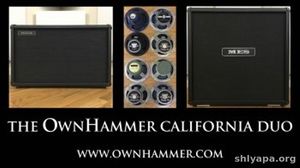Ownhammer Impulse Response Libraries - California Duo

Impulse Response Libraries | 6.7 GB
Links update: 19/01/2026
CABINETS AND SPEAKERS
The “212 3QTR” is based on a Mesa Boogie Three Quarter semi open back 2x12 cabinet.
- “BLU” based on 1963 Celestion T530 “Blue Alnico” speakers.
- “C90” based on Celestion G12-80 “MC-90” speakers.
- “LYN” based on Celestion G12-50GL “Lynchback” speakers.
- “V30” based on Celestion Vintage 30 speakers.
The “412 TRAD” is based on a Mesa Boogie Rectifier Traditional Straight 4x12 cabinet.
- “H30” based on pre-Rola Celestion G12H-30 speakers.
- “M25” based on pre-Rola Celestion G12M-25 speakers.
- “V60” based on 60 watt Celestion Vintage 30 speakers.
- “V70” based on 70 watt Celestion Vintage 30 speakers.
SINGLE CABS SPEAKER BLENDS
In the 212 3QTR and 412 TRAD sections, each of the cabinets contains mixes of two speakers for all available permutations of speaker types within that enclosure. The naming convention is an indication of sonic characteristics regarding the way they are combined and is as follows:
“Speaker 1 + Speaker 2” - where the speaker listed first is the dominant one in the mixture.
CAB BLENDS
In the Cab Blends section, cabinets are mixed together in complimentary pairs using the same naming convention type as the single cabs section:
“Cab/Speaker 1 + Cab/Speaker 2” – where the cab and speaker listed first is the dominant one in the mixture.
SUMMARY
The mix files in the “Summary” folder are based on a 57 + 70 + 121 mic combination. This mix fits somewhere in the middle of the brightness and darkness scale of the OwnHammer pre-made mix types. There is a single file representing each individual cab/speaker combination from both the single cabs and cab blends sections.
THE MICS AND MIC MIXES
In this library, the speaker cabinet was sampled with many microphones and capture types.
For microphones with position numbers 00 through 10, these positions represent movement across the face of the speaker along the relative sweet spot from brighter and closer to center (00) to darker and further out on the cap or cone (10). These numbers do not represent any specific unit of measure and are merely sequential arbitrary definitions.
Positions labeled “EDGE” place the microphone near the rim of the speaker cone, but still in a tonally usable area.
Positions labeled “FRED” place the microphone at the very center of the speaker at a 45 degree angle, ala the popular “Studio Fredman 45” technique.
Below are explanations of the mic models and pre-made mix types:
MICS
“57” is based on a modern production Shure SM57 dynamic microphone. “70” is based on a Microtech Gefell UMT70S condenser microphone. “121” is based on a Royer R121 ribbon microphone.
“160” is based on a Beyerdynamic M160 ribbon microphone.
“414” is based on an AKG C414 B-ULS condenser microphone.
“421” is based on a vintage Telefunken MD421-5 dynamic microphone. “MID” is based on a mid field placed AEA R92 ribbon microphone. “REAR” is based on a vintage Neumann KM84 condenser microphone. “ROOM” is based on a vintage Neumann KM84 condenser microphone.
MIXES
“CHUNK” is based on a more “fat” sounding version of the BOLD mix.
“BOLD” is a proprietary mix that has a forward midrange with a slightly relaxed top and bottom end. “CUT” is based on an on-axis 57 and off-axis 57 mic combination.
“CUT+121” is based on a 121 added to the Quick-Start CUT mix.
“JS” is based on a multi-mic configuration created by Jon Symons.
“MDRN” is based on a 57 + 421 mic combination.
“OH1” is based on a 57 + 121 mic combination.
“OH1F” is based on a more “fat” sounding 57 + 121 mic combination.
“OH2” is based on a 421 + 121 mic combination.
“OH2F” is based on a more “fat” sounding 421 + 121 mic combination. “SP2” is based on a multi-mic configuration created by Scott Peterson.
QUICK START CONTENTS
The Quick Start folder contains the OwnHammer picks for the most universally ideal single mic and mix positions. Though your mileage may vary, this is a great starting point to get an idea of the overall sound of the cab, speaker, mics, and mixes, and discovering which options you may wish to explore further in the auditioning process.
MID BOOST FILES
In the Quick Start folder, all contents have a traditional entry picked from the Mics and Mixes sections, as well a Quick Start contents exclusive feature: the mid boost alternate voicing. The Mid Boost files end with an “M+”, and can be useful in counter balancing bright or scooped amps or amp models, guitars and pickups, bus processing, and/or playback systems – especially PA’s at high volumes. M+ IR’s can also be appropriate for exposed and center panned solo/lead guitar sections in both tonality and feel, or personal/artistic preference to mid heavy tones.
Wave audio format IR's (.wav) are compatible with convolution reverb type loaders in recording software and outboard hardware units and are provided in:
24 bit resolution
44.1, 48, 88.2, and 96 kHz sample rates
mono channel count
minimum phase transformed ("Mpt") and non-minimum phase transformed
200 and 500 ms decay tail lengths
For added convenience, .wav files appropriate for conversion or submission to the following platforms have been separated out and designated within the library structure:
Atomic Amplifire
Fractal Audio Systems hardware/software
Kemper Profiling Amp
Line 6 Helix
Two Notes hardware
KNOW YOUR PLATFORM'S FILE FORMAT!
THIS LIBRARY CONTAINS .WAV FORMAT FILES ONLY.
Home page
CLiCK HERE FOR DOWNLOAD
[ Report broken link!!! ]

Русские пользователи - используйте ВПН для скачивания!
Наши ссылки не работают для России и возможно каких-то других стран!
Russian users - use VPN to download!
Our links do not work for Russia and possibly some other countries!


| 
